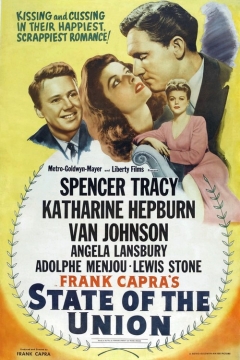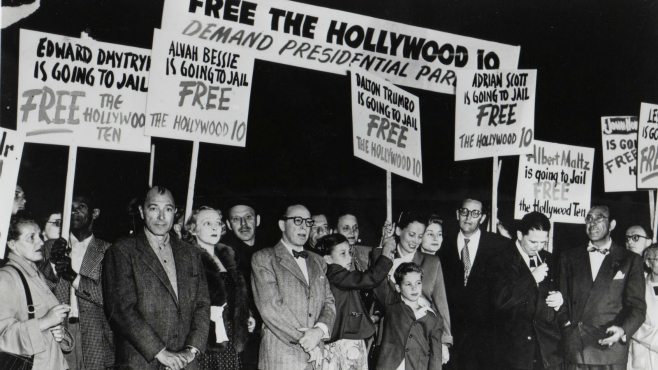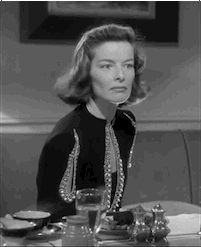A Year with Kate: State of the Union (1948)
 Wednesday, June 18, 2014 at 6:00PM
Wednesday, June 18, 2014 at 6:00PM
Episode 25 of 52: In which Kate confronts Angela Lansbury onscreen and the Blacklist offscreen and manages to beat both.
 Early on, I stated that sometimes Kate’s career seems charmed. I’d venture 1948 is one of those charmed years. As we saw last week, Song of Love failed--Kate’s first failure at MGM. Yet some strange circumstances and good luck landed Kate in State of the Union, based on a Pulitzer Prize-winning play. I say “good luck” because in the fall of 1947, the storm that would become the Hollywood Blacklist was brewing, and Kate nearly got caught in the center of it.
Early on, I stated that sometimes Kate’s career seems charmed. I’d venture 1948 is one of those charmed years. As we saw last week, Song of Love failed--Kate’s first failure at MGM. Yet some strange circumstances and good luck landed Kate in State of the Union, based on a Pulitzer Prize-winning play. I say “good luck” because in the fall of 1947, the storm that would become the Hollywood Blacklist was brewing, and Kate nearly got caught in the center of it.
Though not as cloyingly obvious as Mr. Smith Goes to Washington - no light from the Lincoln Memorial in this film - State of the Union nevertheless delivers the classic Capra Corn package: nostalgia, patriotism, and a happy ending snatched from the jaws of tragedy at the last second. Spencer Tracy plays Grant Matthews, a self-made businessman who abandons his political and marital morals in order to run for president. Matthews is Mr. Smith if he’d met a lobbyist on his way to Washington: an idealist and a patriot, but also an egotist with political aspirations. In a word: corruptible.
Despite this refreshingly layered central character (played with well balanced self-awareness by Spencer Tracy), Capra fills the rest of the cast with his favorite stereotypes: the amoral politician (Adolphe Menjou), the conniving vamp (Angela Lansbury), the wise-cracking journalist (Van Johnson in top form), and most importantly the long-suffering matron, in this case Matthews’s wife, Mary (our own Kate). When Mary arrives (30 minutes in) she acts as Grant’s conscience, arguing loudly for him to practice honesty over chicanery. Kate shines in the comedy but can’t deliver the patronizing Capra monologues well--they come off as shrill and rushed. Unfortunately, she’s one shrill voice among many: the agriculture lobbyist, the labor lobbyist, the judge, the newspaper syndicate owner, etc. The theme of Capra’s State of the Union seems to be, “Every time a cash register rings, a lobbyist gets his wings.” That is, until a True American Patriot can stand up to the corruption.
 Protesting HUAC
Protesting HUAC
The idea of a righteous man standing up to a corrupt oppressor is part of the American identity, but it was also what so many of the actors, directors, and writers who were blacklisted in the 1940s and 1950s had attempted to do. When the Hollywood Ten stood in front of the House Committee on Un-American Activities (HUAC) in Fall of 1947 and refused to testify about their political beliefs, they were not only criminally charged, but also shunned by the terrified studios. Among those Kate worked with who would face HUAC and the blacklist were Ring Lardner Jr. (Oscar-winning writer of Woman of the Year), Donald Ogden Stiers (The Philadelphia Story and Without Love), and Dalton Trumbo.
Kate herself would face her biggest backlash that fall. In the November 1947, just days before the Hollywood Ten and the Waldorf Statement, Kate’s name was popping up with alarming regularity as a possible Commie next to names like Charlie Chaplin and Paul Robeson. Always one to stand by her convictions, Kate had made an unpopular political speech in May (wearing a red dress), and now insisted on joining the Committee for the First Amendment to protest HUAC. By the time Song of Love opened, Hedda Hopper was gleefully reporting that Kate’s image on movie screens was being stoned by patriotic patrons. Fortunately, Kate was already shooting State of the Union, a movie where she declares twice that she is a Republican, and stands--however woodenly--as the nationalistic moral conscience of a film made by a decorated hero.
This is what I mean by luck. HUAC didn’t go after A-List stars (too risky), but if Kate had starred in a few more flops, or if Claudette Colbert hadn’t gotten sick and had to drop out of State of the Union, or if Kate socked Adolphe Menjou on set for being a Friendly Witness to HUAC instead of being WASP-y and polite, Hepburn may not have stepped into Capra’s flagwaving film in October 1947. As it was, State of the Union was a success when it opened in 1948. Kate was (at least affiliated with) a patriot, so she stayed an A-List celebrity, and the Communist rumors slowly faded. It was like getting a seal of approval from a bald eagle. It’s a pity though. I’d have loved to see Kate smack Adolphe Menjou.

 Previous Weeks: A Bill of Divorcement, Christopher Strong, Morning Glory, Little Women, Spitfire, The Little Minister, Break of Hearts, Alice Adams, Sylvia Scarlett, Mary of Scotland, A Woman Rebels, Quality Street, Stage Door, Bringing Up Baby, Holiday,The Philadelphia Story, Woman of the Year, Keeper Of The Flame, Stage Door Canteen,Dragon Seed, Without Love, Undercurrent, The Sea Of Grass, Song of Love
Previous Weeks: A Bill of Divorcement, Christopher Strong, Morning Glory, Little Women, Spitfire, The Little Minister, Break of Hearts, Alice Adams, Sylvia Scarlett, Mary of Scotland, A Woman Rebels, Quality Street, Stage Door, Bringing Up Baby, Holiday,The Philadelphia Story, Woman of the Year, Keeper Of The Flame, Stage Door Canteen,Dragon Seed, Without Love, Undercurrent, The Sea Of Grass, Song of Love
Next Week: Adam's Rib (1949) - In which Tracy and Hepburn's best comedy shows that love, life, and law are a circus.



Reader Comments (10)
Ugh, the blacklist. Occupies such an ugly, ugly space in our entertainment history. Glad to hear of someone avoiding it but mercy, how easy it was to be ruined.
Margaret--I agree. An ugly, awful time.
Apologies for the impromptu history lesson, but I don't think one can write about Hollywood in 1947 and 1948 and ignore the red elephant in the room, so to speak.
If anybody wants to read more, there are some great resources out there on the Blacklist:
The Inquisition in Hollywood: Politics in the Film Community, 1930-60 by Larry Ceplair and Steven Englund
THE HOLLYWOOD TEN, a short film by (blacklisted) filmmaker John Berry
Tender Comrades: A Backstory of the Hollywood Blacklist by Patrick McGilligan and Paul Buhle
The Hollywood Reporter covered its own shameful role in the Blacklist extensively in 2012.
In addition, many of the transcripts for the HUAC hearings are available on archive.org and elsewhere. Two I'd suggest reading are Ayn Rand (who was a friendly witness) and Judy Holliday, who had a closed hearing. The Rand testimony is about as crazy as you'd expect. Judy Holliday managed to convince HUAC that she was too dumb to be a Communist. A gutsy defense, to be sure, especially since she had a genius-level IQ.
I'm surprised you're so reserved on this film. I stumbled across it more or less by accident just last year and I was blown away. I'm surprised it's all but forgotten. It should be at least as well known as Mr Deeds (to which it's superior).
I don't remember Hepburn sounding particularly false here and I thought the dialogue was pretty acute and all around fabulous throughout (okay, until the last 5 minutes... cause, you know, Capra). I'd rank this just a notch below Adam's Rib as the second-most awesome of the Hepburn-Tracy pairings.
Also it was interesting to see how little politics (or at least its representation in prestigious work) had changed between this and The West Wing.
I love this film and think it's one of the best pairings of Hepburn and Tracy. Their interactions for the first time seem like that of a long time couple, a major flaw in the previous Sea of Grass.
I'd never read that Claudette Colbert was ill when she exited abruptly, always that she made demands such as a irrevocable quitting time of 6:00 and restructuring of sets so only her best angles would be shown. Capra refused so she walked and faced with that crisis Kate stepped in, at Tracy's suggestion, because she had been running lines with him and already knew the part.
No love for Angela Lansbury's marvelous work as the draconian Kay Thorndyke? It's not only that she so ably and believably plays a woman who, it's inferred, is middle aged at 23. Her skillful villainy makes a part that with a lesser actress would have remained a shadowy figure memorable. In a way Kay seems like an early blueprint for The Manchurian Candidate's Mrs. Iselin. She's certainly as soulless.
Of course as with most Capra all of the secondary roles are filled with top notch character work from high quality actors and actresses. Margaret Hamilton is a gem in her small role as Norah, the imperturbable housemaid and even Van Johnson, an actor I personally have a low tolerance for, is in top form as you said Anne Marie. I think this is the best work I've ever seen him do utilizing his innate smarm and charm in a proper balance. He was always best in small doses, I never understood him as a leading man.
There is some Capra corn involved but going in you have to expect if you're at all familiar with his work and it's not ladled on with a trowel.
This was a big step forward from the patchy bunch that she'd been working through since Woman of the Year. With only an occasional misstep, The Iron Petticoat!!, the upcoming group is a much more promising bunch until after Lion in Winter. Hooray!
I honestly had so much to cover with this one that I wasn't able to talk as much about the film as I wanted to. I really enjoyed State of the Union! KHep and Spence have great chemistry together, their comedy is stellar, and I 100% support any film that has Angela Lansbury with an Evil Diva white streak in her hair. Also the return of Drunk Kate! I always love Drunk Kate.
This is much more a Capra movie than a traditional Tracy Hepburn movie (however you choose to define). It mirrors Deeds and Mr. Smith in its Capra moral speeches and the fundamental goodness of people. The reference to West Wing is intriguing. I have no doubt that Aaron Sorkin is a Capra fan because so much of his work has the same declaratory moments. Mr. C was an Italian born immigrant, a grateful and unabashedly idealistic American in his approach in all of his movies. But in some ways, this is Capra's version of the ennui post war movies; a Capra corn Best Years of Our Lives, a little darker and more cynical than his pre-war comedies.
Why not my enthusiastic endorsement? Kate’s character is much less a full person, than in her other better roles. This is a stereotype role, the strong but loyal wife. We never get a clue why Kate puts up with this marriage or this campaign except for her “ideals” which never seem to be hers….just her husband’s.
Her drunk scene has very little of the charm of Philadelphia Story or Adam’s Rib, just another reason to make a speech (see above). And there are host of political movies from Advise and Consent, The Best Man (1964), The Candidate that continually carry these same themes quite before The West Wing. This was a far more political and riskier movie than its contemporaries, The Farmer’s Daughter or the Senator Was Indiscreet. This movie at least has 2 substantial women characters, something most of the rest lack.
Why does it belong in the Tracy Hepburn pantheon? It is a Good Movie, something Kate had not had in a quite a while as well we know from these past painful weeks. As Joel mentions, it supporting cast strengthens the movie. And for the time is was groundbreaking, and its original play was a reflection of Wendell Willke’s long time affair outside of his marriage. And Willke would have been the role model for this maverick candidate. It was 1948, America had won the War, we knew we were in the American Century, but an unease lingered. Capra took a Pulitzer prize winning play and with the blessing of a great cast , he created a way we still think about American politics.
I remember liking it though not loving it when I saw it at BYU lo these many, many years. At least Kate had her hair halfway down, and therefore it might be the last time she was allowed to look girlish. I mean African Queen is right around the corner after all. Thank heavens.
This is a seriously weird movie, never more so than when Tracy launches into his big "i have a dream for a perfect world speech" and his pitch is a one nation United States of the World-style government. That is so post-WWII lefty that it's like... wow. Bracing.
Otherwise I've always thought that this was a slightly less successful variant on the "flawed but decent man corrupted by power, then saved by the love of a flawed woman" movies that Capra specialized in. He loved to position imperfect people against inherently corrupting institutions and let them struggle to live up to impossible ideals - until they manage to succeed, often with speeches. I haven't seen this one in a while so I can't really remember the particulars of the performances, but I remember thinking Hepburn acquitted herself quite well, if maybe not as well as some of Capra's past leading ladies.
And now, a little side rant: the "Capra Corn" label is inescapable, but I've never liked it, because it seems to assume that nostalgia and sentimentality and patriotism are inherent flaws in his films, things you have to get past in order to "properly" appreciate them (the same knock applies, to a lesser extent, to some of John Ford and Charlie Chaplin films, though their overall reputations haven't seemed to suffer as uniformly). Maybe that's not the case here, I'm not trying to put words in people's mouths, but I've just never liked the term. I think things like this, Deeds, Mr Smith, John Doe and It's a Wonderful Life are frequently complex, dark films, leavened with a lot of comedy, in which Capra's nostalgia and sentimentality are weapons deployed against cynicism and corruption, and the tension between those forces, as embodied by his generally flawed characters, is always fascinating. Dismissing it - and I don't see how it can't be anything other than dismissive, but I'm happy to hear a countargument - as "Capra corn" just seems to close off discussing some of the most interesting aspects of his work.
Roark,
You are correct, and I did not mean to disparage what might rather be called the Capra catechism by using the word Capra Corn. Chalk it up to blogspeech…a fast way of blundering to the points you have made. Sentimentality is not always bad and Capra’s themes are often dark. I was trying to put this movie in the post war perspective (Gentlemen’s Agreement, Best Years of Our Lives) that had a little more let down, a little more cynicism than what we sometimes think of the resurgent American post war years.
Leslie - thanks, i liked your placement of the film within Capra's career, and the post-war context.